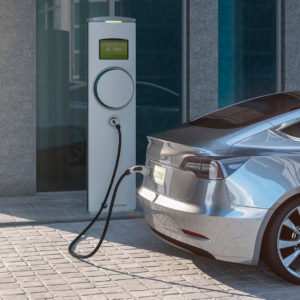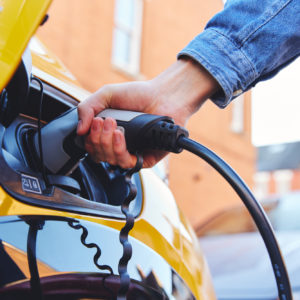Electric vehicles (EV’s) come with their own specialized Level 1 “trickle” charger, which is made to be used with any home’s standard 120-volt outlet. These chargers typically measure around 6 to 20 feet long. But what happens if the charger line doesn’t reach your electrical socket? Can you use an extension cord to go the extra few feet, or would that pose a danger to your vehicle (and your household)?
Reasons You Shouldn’t Use an Extension Cord with Your EV Charger
Charging your EV while the charger is attached to an extension cord is generally a bad idea. In fact, many manufacturers warn against it in their manuals. This is mostly due to the fact that EV chargers require higher current than most extension cords are designed for. Extension cords are more for smaller appliances. If you use extension cords that are meant for low-current appliances with your EV charger, you can expect it to send insufficient current. This can either lead to an inefficient charge or even dangerous situations like fires and electric shock hazards.
Potential Fires
The cables might overheat, which can melt the insulation around the wires and start a fire. While there are higher capacity cords on the market, even they aren’t made to be used for long, continuous periods of time. EVs require hours upon hours of continuous charging to fill their battery, and so even high-capacity extension cords can overheat and cause charging issues. This is dangerous enough on its own, but if anything happens while you’re asleep or when you’re away from the house, things can quickly get much worse.
Electric Shock Hazards
Another possible hazard from using an extension cord for EV charging is electric shock. Because the extension cord is handling a higher current than it’s meant to, the cable becomes more volatile. This leads to more unstable power transfer, and plugging and unplugging your vehicle into the wall becomes more risky.

Alternatives to Using Extension Cords for Your EV Charger
While using extension cords is a bad idea, you might be able to get away with EV charging with an extension cable. These EV extension cables are specifically designed to work with your EV’s high-current needs. They typically have adequate ingress protection (IP) ratings, power ratings, and circuit breakers. Remember though that you can’t string these extension cords together to make even longer lines. Attaching more than one extension cable to your charger can compromise the connection. Alternatively, you could also opt to buy a longer charger entirely.
How To Use Your Plug-In Level 1 EV Charger
There are different types of EV chargers out there, but the most common one you’ll find shipped with your vehicle is a Level 1 “trickle charger.” These chargers simply need to be plugged into your standard 120-volt socket and they’re good to go. You can slot the other end of the charger to the standard SAE J1772 charge port, which is also known as the J port, on your EV to begin charging. Just make sure to turn off your EV before charging, and store your cord safely afterwards. You can even bring the cord with you in case of low charge emergencies. It’s especially useful if you can’t find a nearby charging station but have an available socket nearby.
Using an extension cord with your EV charger is ultimately a bad idea unless it’s specifically made for EV charging. You don’t want to risk damaging your vehicle or your home if a regular extension cord overheats. If you really can’t make the charging cable reach the wall socket in your garage, purchase a longer charger or an EV extension cable. Save yourself the worries and hassles that come with using inadequate EV charging cable extensions.
Any information provided on this Website is for informational purposes only and is not intended to replace consultation with a professional mechanic. The accuracy and timeliness of the information may change from the time of publication.















